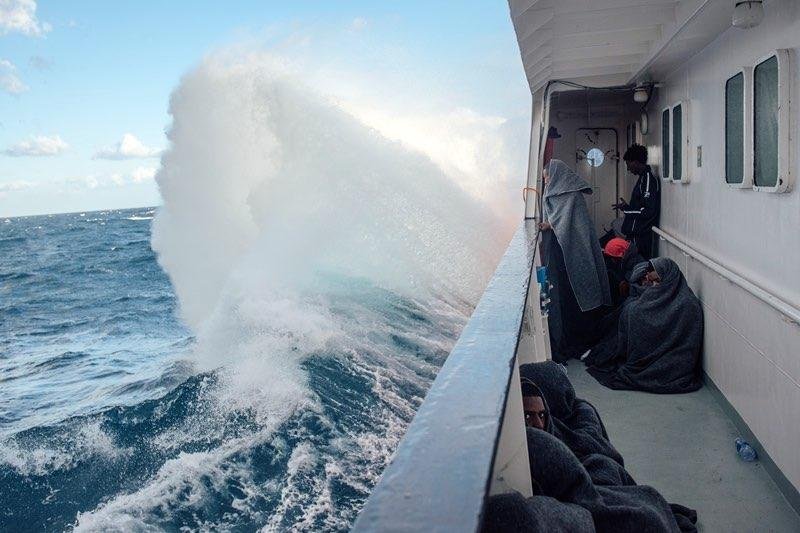1 of 3 | High seas batter the side of the MSF-SOS Mediterranee search and rescue vessel MV Aquarius as refugees and migrants attempt to shelter from the wintry conditions on its decks on December, 29, 2016. Photo by Kevin McElvaney/MSF
Almost 9,000 people were rescued last week on the Mediterranean Sea. Ed Taylor, Medecins Sans Frontieres' project coordinator onboard the MV Aquarius, relives one such rescue on March 26. The search and rescue vessel, which has a 21-person crew and is run jointly by MSF and French charity SOS Mediterranee, rescued 515 people in five boats on one day last week.
She isn't breathing, but her body is still warm. We lift her from the speedboat without even using a stretcher, her arms and legs dangling. With her limp body on deck – we continue the compressions. Hammering her chest in the hope that her heart will beat once more.
After 40 minutes, she's cold. Her chest has become soft with the almost nonstop force. Her long hair obscures her face, along with petrol burns and abrasions.
If I had to guess, I'd say she was 22 or 23. I don't even know her name.
The time of death is recorded as 03:20 a.m. Her condition was first signaled by someone else in the overcrowded dinghy, which departed Libya the day before. In the dark, no one had noticed her lapse into unconsciousness, face down on the dinghy, in a pool of petrol and seawater.
Taken from the dinghy, she was transported via high-speed rescue boat to the search and rescue vessel Aquarius, run by Medecins Sans Frontieres and SOS Mediterranee. On the way, she was given CPR.
She died; 645 others lived in a rescue operation that began at midnight and ended at 9 a.m.
I've never been this tired. After nine months onboard the Aquarius as a logistician and now the project coordinator, I've seen moments of remarkable joy, and moments of crushing tragedy. I've learned how to feed hundreds of people very quickly, and how to handle the deceased respectfully, until they're handed over to the morgue.
Right now it's my job to bring hot cups of tea to 645 people, and to remain positive. It's no exaggeration to say that tea sometimes feels like a lifesaver – when people are cold, exhausted, grieving or deprived of glucose – tea makes a big difference.
I'm grateful for every life that's spared. Every one of the people on this vessel has aspirations – some of them grand, some humble. Most of all I'm grateful that I don't have to deal with more death.
When I have a spare moment, I check social media and read the news. I am frequently unsettled, if not flabbergasted, by the number of accusations cast at those who would rescue other human beings from drowning.
Frequently people leave comments suggesting we take those who have survived and drop them off on the coast of Libya – currently a lawless state, from which people emerge bearing the scars of torture. There are even occasional allegations that suggest we have been working with smugglers for some gain – a self-defeating argument when you consider how much it costs to charter a search and rescue vessel.
Yes, it is as simple as saving lives.
It has become increasingly hard to discuss this issue in a reasoned and constructive manner, and I fear that many no longer have access to the objective information they need to make an informed opinion.
Europe has for many years enjoyed its association with the ideas of equality, due process, human rights and tolerance – phrases touted by so many leaders, which now ring hollow.
It's easy to question people's motives from behind a newspaper or a keyboard. This ease is granted by the stability of our nations, but things change and sometimes they change faster than we expect. One day it may be us or our children or our grandchildren running for our lives. If that day comes, I sincerely hope there is someone there to pull us from the water.
Having later signed off on the death certificate and report written by the doctor onboard the Aquarius, I now know that the girl who died was called Berte, after her mother. She was 22 years old, and on the day she died, she chose to wear a red, navy and white striped jersey.
![]() This article originally appeared on Refugees Deeply, and you can find the original here. For important news about the global migration crisis, you can sign up to the Refugees Deeply email list.
This article originally appeared on Refugees Deeply, and you can find the original here. For important news about the global migration crisis, you can sign up to the Refugees Deeply email list.















